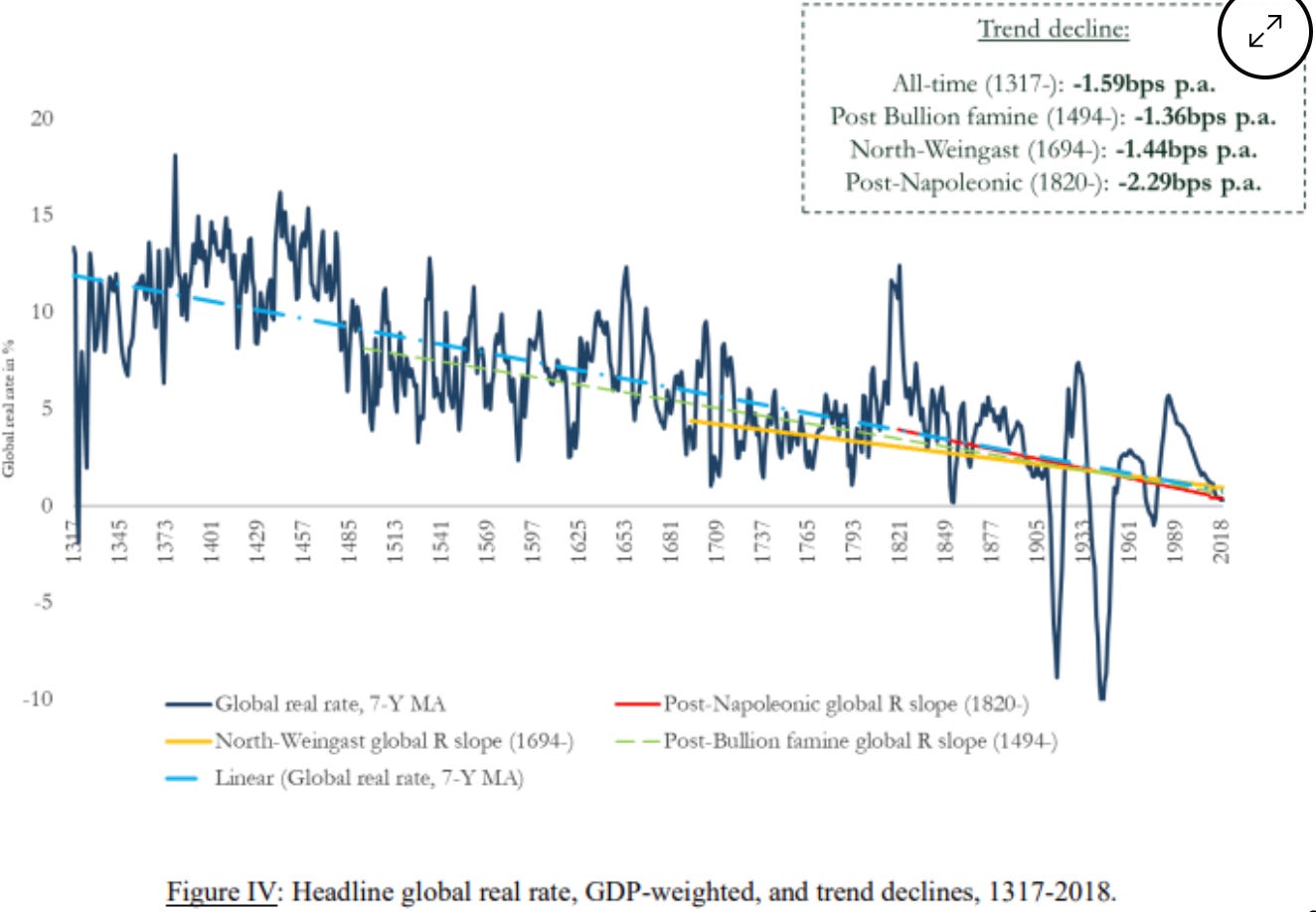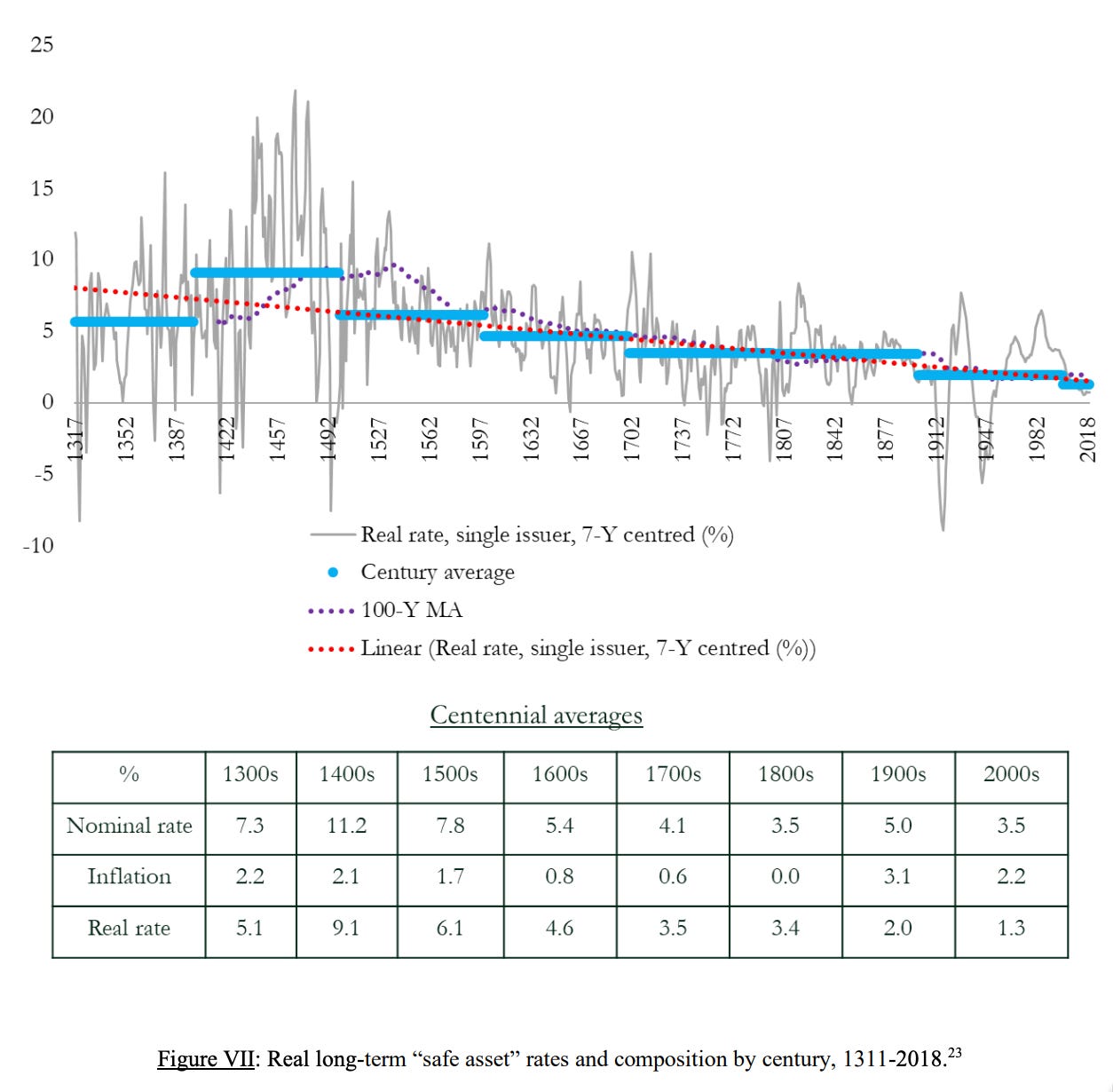BRIEFLY NOTED: For 2023-09-19 Tu
Gelman on crypto cheerleaders; Schmelzing on long-term interest rates; Tedeschi-Trucks; very briefly noted; & Kuper on Britain, Kambhampati on LLMs, the FT-Booth economists panel, Yglesias on how...
Gelman on crypto cheerleaders; Schmelzing on long-term interest rates; Tedeschi-Trucks; very briefly noted; & Kuper on Britain, Kambhampati on LLMs, the FT-Booth economists panel, Yglesias on how policy-moderate Republicans could run the table, I participate in an inflation-outlook panel, & I briefly note...
MUST-READ: What Sustained & Reinforced the Crypto Bubble?
Must bubbles have a story, or a semi-credible story—something that keeps the overwhelming bulk of those who might find a way to go short the bubble from doing so, something that makes a lot of people say: “you know, this time the cock-eyed optimist loons might have a point”. There had to be a start, Charles Kindleberger said, in a displacement—an event or innovation occurs that sharply changes expectations grounded in reality and good intentions because it brings clear and visible opportunities for operating profit. But in crypto there never was that initial displacement, there never were immediate possibilities for visible operating profits. Instead, the story was always nothing more than Number Go Up. This is, I think, an order of magnitude stranger than anything we have seen befoe—the South Sea Company, after all, had a very interesting business plan that made huge amounts of money when it was implemented by the Bank of England. And Andrew Gelman muses about these things here:
Andrew Gelman: Crypto scam social science thoughts: The role of the elite news media and academia: ‘The usual way we think about scams is in terms of the scammers and the suckers, and also about the regulatory framework that lets people get away with it. Here, though, I want to talk about something different, which is the role of outsiders in the information flow. For crypto, we’re talking about trusted journalistic intermediaries such as Michael Lewis or Tyler Cowen who were promoting or covering for crypto. There were lots of reasons for respected journalists or financial figures to promote crypto, including political ideology, historical analogies financial interest, FOMO, bandwagon-following, contrarianism, and plain old differences of opinion…. pretty much the same set of reasons for respected journalists or financial figures to have been crypto-skeptical! My point here… is that the infrastructure of elite journalism was, I think, crucial to keeping the bubble afloat…. I’m just interested in these sorts of conceptual bubbles… and how they can stay afloat in Wiley E. Coyote fashion long after they’ve been exposed…. Paradoxically, crypto’s lack of value—actually, its negative value, given its high energy costs—can make it a more plausible investment than businesses or ideas that could potentially do something useful if their claims were in fact true…
TWO IMAGES: Schmelzing’s Long-Term Interest Rates:
ONE VIDEO: Midnight in Harlem:
Very Briefly Noted:
Economics: Dylan Patel: How to Guesstimate SMIC’s 7nm Yield: ‘In the… Kirin 9000S… there doesn’t seem to be a ton of device-to-device variation, which implies… their real yield is good. Now, all of these are soft, but… don’t believe… this chip has a 10% yield…
Economic History: Rohit Krishnan: Innovation: A data based look at how innovations came about through all of human history…
Tim Burke: Cookbook Survivor: Autumn, When the Living Is Easy: ‘Vindaloo… simplistic critiques of cultural appropriation wither in relationship to the complexity of history… a South Asian flavor profile transforming a Southern European style of cooking inflected through the need to slow cook dried or salted meat, all coming together through the early modern Portuguese presence in Goa…
Political Economy: Paul Blumenthal: The Biden Administration Is Making It Easier To Get Government Benefits: ‘The effort to reduce the “time tax” spent on accessing government benefits aims to make them more accessible and reduce inequality…
Neofascism: Joe Scarborough: ‘Trump confuses Biden for Obama and then says Biden is “leading us into WWII”…
Kara Swisher: ‘It was indeed not at accident that the Toxic Twins [Trump and Musk] attacked Yoel Roth—it was a coordinated assault by the goon squad. Read…
Noah Smith: ‘The MAGA movement finally found someone they could get away with hating. However well this stuff plays on Twitter, though, I predict that the American Right's turn toward antisemitism will ultimately hurt them at the polls….
Journamalism: Duncan Black: Perfect Timing: ‘I'm still laughing at the timing of the drop of Politico's Boebert beat sweetener…
GPT-LLM-ML: Amy Castor & David Gerard: Pivot to AI: Pay no attention to the man behind the curtain: ‘The magical claim of machine learning is that if you give the computer data, the computer will work out the relations in the data all by itself. Amazing! In practice, everything in machine learning is incredibly hand-tweaked…. The real-world use case for large language models is overwhelmingly to generate content for spam…
Public Sphere: Katie Mack: ‘My general opinion is that “good vibes only” is not a great strategy for life but is a perfectly good—possibly optimal—one for social media. If someone makes you furrow your brow a millimeter, go ahead and block, this is just a weird little phone app we’re hanging out on for a minute…
NOTES & Substack Posts:
Neofascism Watch: I very much hope that this is true—but the problem is that the 40% still pro-BREXIT minority in Britain is 75% of the Tory Party and 50% of England, so its neofascist and austerian fit is not over yet. Simon is, I think, much too optimistic here:
GPT-LLM-ML Watch: This is a much better statement than I have ever managed to make of my point that LLMs are just stochastic parrots—but that most of our mental life is stochastic parrotage as well:
Economics Watch: As I understand it, it is not that a majority of us economists on the FT-Booth survey panel think the Fed has more work to do, as a majority of us economists on the FT-Booth survey panel think that at some moment over the next six months a majority of voting members of the FOMC will think the Fed has more work to do. I must confess that, given the Fed’s reluctance to reverse this meeting what it did last meeting, the optionality advantages of standing pat seem to me to be overwhelming. There is still a bunch of contractionary impulse in the pipeline that has not hit the real economy yet, and given the Fed’s peculiar psychology it is still easier for it to catchup on the tightening side than for it to start cutting on the loosening side:
Political Economy Watch: I think Matt is 100% right here. A Trump who was semi-competent and not a greedy asshole would have been very popular indeed. A Romney who had run for President as he ran for Governor of Massachusetts would have been unstoppable. “He fights—and that’s good” is the wrong lesson that even the Hater majority of right-wing activists and influencers should draw from Trump, at least it would be if they were interested in anything other than being haters:







On crypto: it was even worse than Andrew Gelman says it was. The real outside experts in crypto were the banks, who had been running cooperative (if not distributed) ledgers for decades. And the journos never seemed to talk to them. Or maybe they talked to the banks, but didn't like what the experts said. Or maybe their little journo brains said "aha, conflict of interest! Dinosaurs of the past!! I don't have to listen to these guys."
The banks were intrigued by crypto for about 3-4 years after it came out. By then, they grokked that crypto was either Ponzi or money laundering. (Libra/Diem was not really crypto.) That would be 2013 or so? The banks were willing to sell support to the scamsters and chumps, such as deposits or clearing facilities or the like. But they otherwise stayed out of the crypto game.
Financial journalists such as Weisenthal & Alloway (Odd Lots) devoted a vast attention to crypto, much of it uncritical. At least Matt Levine drew out the absurdity of SBF. I guess crypto journalism increases enthused traffic, sort of like Trump.
Now Tyler Cowen is euphoric over AI, which should give us pause given his crypto history. Which is not to say that LLM's won't be valuable tools (and trash), but it is too early to figure out how, and how well the technology is implemented. If we look at other new technologies, from railroads to radio to Internet, we see the wreckage of fraud and malinvestment. Cowen is much smarter than me, but what is in crypto or AI for him? Is he merely captured by the interest and investments of the tech bros such as Thiel?